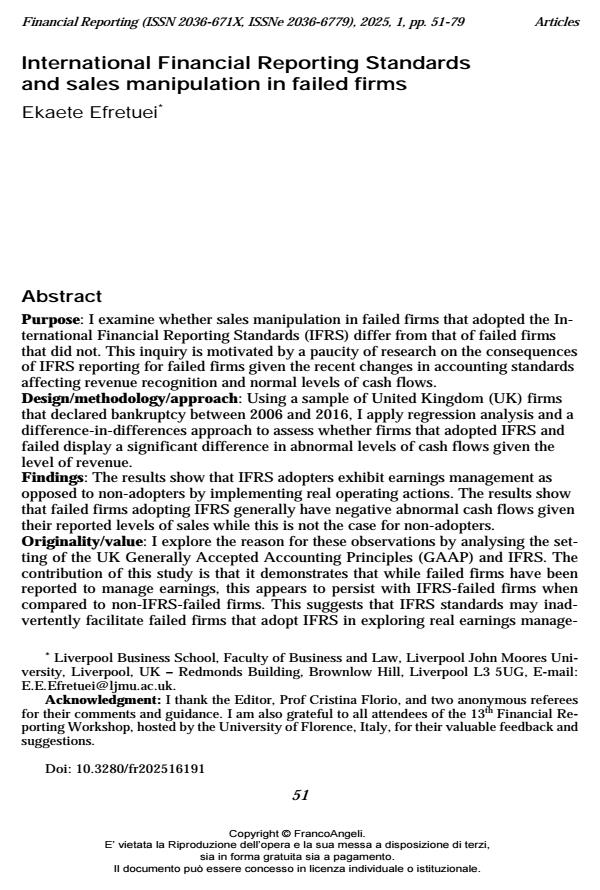International Financial Reporting Standards and sales manipulation in failed firms
Journal title FINANCIAL REPORTING
Author/s Ekaete Efretuei
Publishing Year 2025 Issue 2025/1
Language English Pages 29 P. 51-79 File size 199 KB
DOI 10.3280/fr202516191
DOI is like a bar code for intellectual property: to have more infomation
click here
Below, you can see the article first page
If you want to buy this article in PDF format, you can do it, following the instructions to buy download credits

FrancoAngeli is member of Publishers International Linking Association, Inc (PILA), a not-for-profit association which run the CrossRef service enabling links to and from online scholarly content.
Purpose: I examine whether sales manipulation in failed firms that adopted the International Financial Reporting Standards (IFRS) differ from that of failed firms that did not. This inquiry is motivated by a paucity of research on the consequences of IFRS reporting for failed firms given the recent changes in accounting standards affecting revenue recognition and normal levels of cash flows. Design/methodology/approach: Using a sample of United Kingdom (UK) firms that declared bankruptcy between 2006 and 2016, I apply regression analysis and a difference-in-differences approach to assess whether firms that adopted IFRS and failed display a significant difference in abnormal levels of cash flows given the level of revenue. Findings: The results show that IFRS adopters exhibit earnings management as opposed to non-adopters by implementing real operating actions. The results show that failed firms adopting IFRS generally have negative abnormal cash flows given their reported levels of sales while this is not the case for non-adopters. Originality/value: I explore the reason for these observations by analysing the setting of the UK Generally Accepted Accounting Principles (GAAP) and IFRS. The contribution of this study is that it demonstrates that while failed firms have been reported to manage earnings, this appears to persist with IFRS-failed firms when compared to non-IFRS-failed firms. This suggests that IFRS standards may inadvertently facilitate failed firms that adopt IFRS in exploring real earnings management avenues, particularly concerning sales manipulation, in contrast to non-IFRS-failed firms.
Keywords: sales manipulation, firm failure, real earnings management, bankruptcy, IFRS
Jel codes: M40, M41, M48, M49
- Ownership structure and financial default risk in Italian private firms Velia Gabriella Cenciarelli, in FINANCIAL REPORTING 2/2025 pp.165
DOI: 10.3280/fr202520028
Ekaete Efretuei, International Financial Reporting Standards and sales manipulation in failed firms in "FINANCIAL REPORTING" 1/2025, pp 51-79, DOI: 10.3280/fr202516191